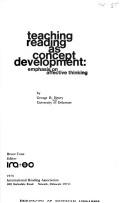| Listing 1 - 10 of 241 | << page >> |
Sort by
|
Book
ISBN: 1462542654 Year: 2020 Publisher: New York, New York ; London : The Guilford Press,
Abstract | Keywords | Export | Availability | Bookmark
 Loading...
Loading...Choose an application
- Reference Manager
- EndNote
- RefWorks (Direct export to RefWorks)
"The development of students' conceptual understanding of the world is vital to their academic success at all grade levels (preschool through high school) and across content areas. This professional resource and course text presents expert perspectives on building conceptual knowledge and vocabulary through reading, writing, and classroom discussion. Topics include the importance of word study and informational texts in early literacy, discussion practices that boost comprehension, the use of multimodal and appropriately complex texts, engaging digital literacies, and discipline-specific writing. Ways to strengthen English learners' conceptual skills are highlighted. Each chapter describes current research, explains how to plan and scaffold instruction, distills Implications for Professional Learning, and offers Questions for Discussion. Key words/Subject areas: concepts, conceptual learning, development, developmental, cognitive, understanding, academic knowledge, content knowledge, background knowledge, vocabulary, reading comprehension, content areas, disciplines, disciplinary, informational texts, multimodal, text complexity, digital literacies, writing, speaking, speech, classroom discussions, teaching, instruction, children, adolescents, students, English language learners, ELs, ELLs, culturally sustaining practices, early literacy, elementary, middle grades, secondary grades, high school, textbooks Audience: Teacher educators and graduate students; teachers, literacy specialists, and other educators working with children ages 4-17 (grades PreK-12)"--
Book
ISBN: 3407651155 Year: 1976 Publisher: Weinheim Beltz
Abstract | Keywords | Export | Availability | Bookmark
 Loading...
Loading...Choose an application
- Reference Manager
- EndNote
- RefWorks (Direct export to RefWorks)
Book
ISBN: 0877782474 9780877782476 Year: 1992 Publisher: Englewood Cliffs (N.J.): Educational technology,
Abstract | Keywords | Export | Availability | Bookmark
 Loading...
Loading...Choose an application
- Reference Manager
- EndNote
- RefWorks (Direct export to RefWorks)
Book
ISBN: 9780415898829 9780415898836 0415898838 041589882X Year: 2013 Publisher: New York: Routledge/Taylor & Francis Group,
Abstract | Keywords | Export | Availability | Bookmark
 Loading...
Loading...Choose an application
- Reference Manager
- EndNote
- RefWorks (Direct export to RefWorks)

ISBN: 0872078523 Year: 1974 Publisher: Newark International reading association
Abstract | Keywords | Export | Availability | Bookmark
 Loading...
Loading...Choose an application
- Reference Manager
- EndNote
- RefWorks (Direct export to RefWorks)
Book
ISBN: 9781138205390 1138205400 9781138205406 1138205397 Year: 2018 Publisher: Abingdon: Routledge,
Abstract | Keywords | Export | Availability | Bookmark
 Loading...
Loading...Choose an application
- Reference Manager
- EndNote
- RefWorks (Direct export to RefWorks)
Concept learning --- Interdisciplinary approach in education
Book
ISBN: 1506355714 1506355722 1506355692 1506355684 Year: 2017 Publisher: Thousand Oaks : Corwin A SAGE Company,
Abstract | Keywords | Export | Availability | Bookmark
 Loading...
Loading...Choose an application
- Reference Manager
- EndNote
- RefWorks (Direct export to RefWorks)
Teachers will learn: Strategies for introducing students to conceptual learning Instructional strategies to help students uncover and transfer concepts How to write concept-based lessons How to assess for conceptual understanding How to differentiate in a concept-based classroom How CBCI aligns with other current best practices and initiatives (like PBL, CCSS, etc.).
Book
ISBN: 9004450009 9789004450004 9789004449985 9789004449992 Year: 2021 Publisher: Leiden Boston
Abstract | Keywords | Export | Availability | Bookmark
 Loading...
Loading...Choose an application
- Reference Manager
- EndNote
- RefWorks (Direct export to RefWorks)
Learning concepts is a real challenge for learners because of the abstract nature of concepts. This holds particularly true for concepts in science and technology education where learning concepts by doing design activities is potentially a powerful way to overcome that learning barrier. Much depends, however, on the role of the teacher. Design-Based Concept Learning in Science and Technology Education brings together contributions from researchers that have investigated what conditions need to be fulfilled to make design-based education work. The chapters contain studies from a variety of topics and concepts in science and technology education. So far, studies on design-based learning have been published in a variety of journals, but never before were the outcomes of those studies brought together in one volume. Now an overview of insights about design-based concept learning is presented with expectations about future directions and trends.
Concept learning. --- Science --- Technology --- Study and teaching.
Book
ISBN: 0138511624 Year: 1979 Publisher: Prentice Hall
Abstract | Keywords | Export | Availability | Bookmark
 Loading...
Loading...Choose an application
- Reference Manager
- EndNote
- RefWorks (Direct export to RefWorks)
Concept learning --- Creative thinking --- Educational innovations
Book
ISBN: 030431370X Year: 1987 Publisher: London Cassell
Abstract | Keywords | Export | Availability | Bookmark
 Loading...
Loading...Choose an application
- Reference Manager
- EndNote
- RefWorks (Direct export to RefWorks)
Concept learning --- Learning, Psychology of --- Schemata (Cognition)
| Listing 1 - 10 of 241 | << page >> |
Sort by
|

 Search
Search Feedback
Feedback About UniCat
About UniCat  Help
Help News
News